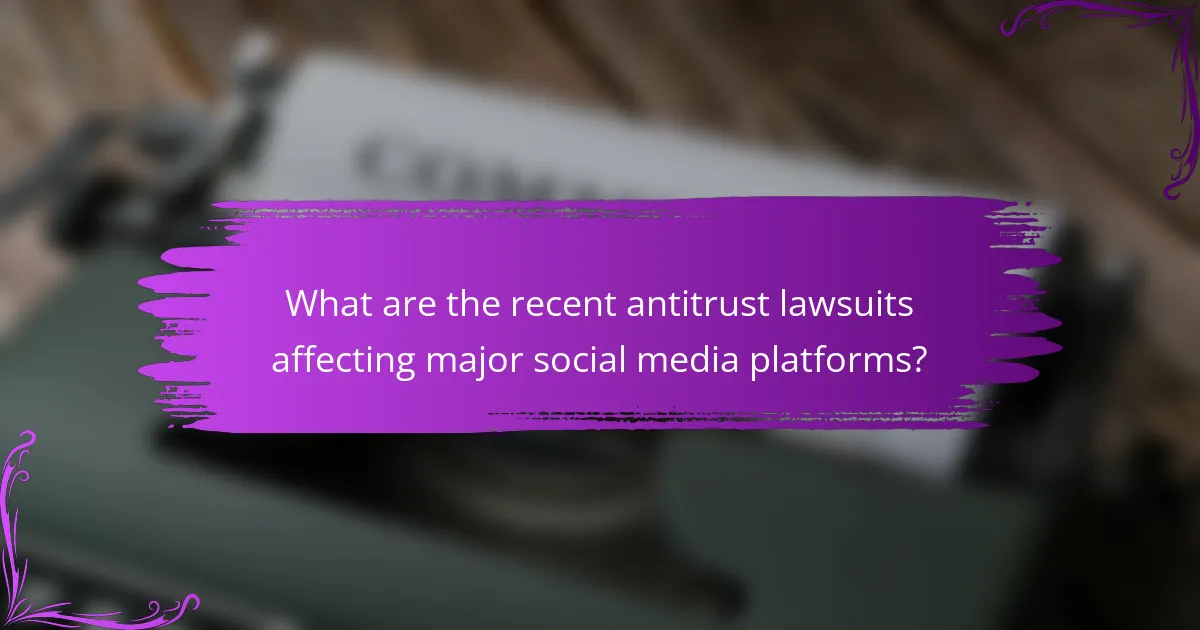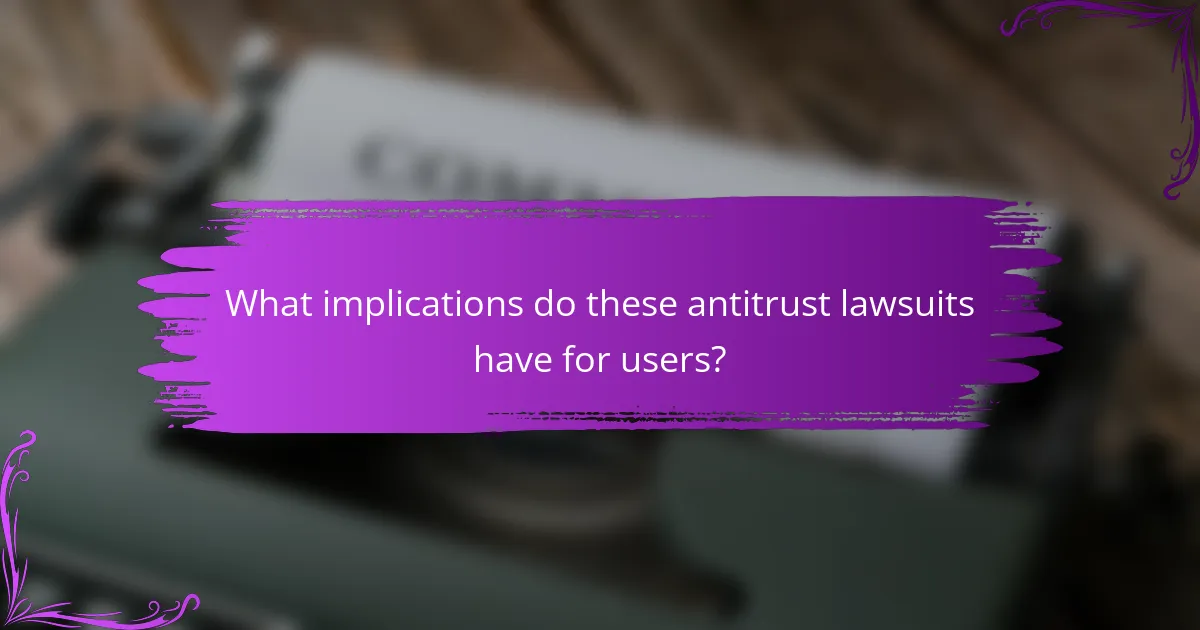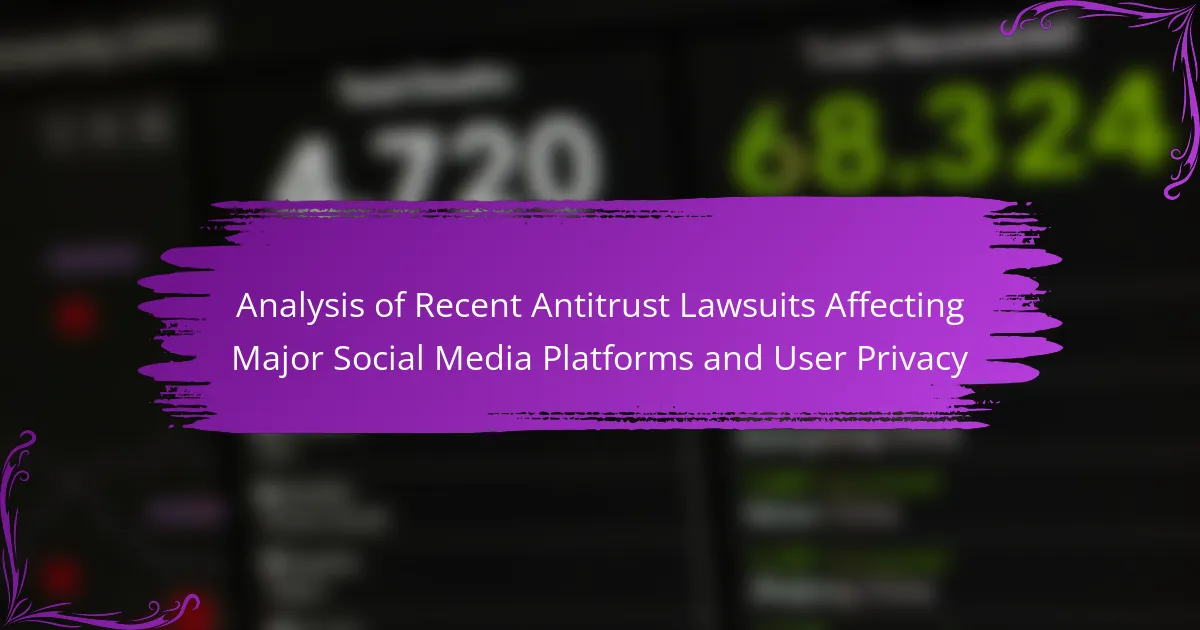
What are the recent antitrust lawsuits affecting major social media platforms?
Recent antitrust lawsuits affecting major social media platforms include actions against Meta, Google, and Twitter. The Federal Trade Commission (FTC) has filed a lawsuit against Meta regarding its acquisition of Instagram and WhatsApp. This lawsuit claims that these acquisitions stifled competition in the social media market. Additionally, states have joined a lawsuit against Google for allegedly monopolizing digital advertising. Twitter faced scrutiny over its market practices as well. These lawsuits reflect ongoing concerns about market dominance and user privacy. They indicate a growing regulatory focus on the power held by these platforms.
How do these lawsuits impact user privacy?
Recent antitrust lawsuits against major social media platforms significantly impact user privacy. These lawsuits often focus on data collection practices and user consent. They challenge the legality of how platforms manage personal information. Increased scrutiny may lead to stricter regulations on data usage. For example, platforms might be forced to enhance transparency regarding data practices. Users could gain more control over their personal information. This shift aims to protect user privacy rights more effectively. Ultimately, these legal actions can reshape the landscape of digital privacy for users.
What specific privacy concerns are highlighted in these lawsuits?
The lawsuits highlight several specific privacy concerns related to data collection and user consent. One major concern is the unauthorized collection of personal data without explicit user consent. Another issue is the lack of transparency in how user data is shared with third parties. Additionally, there are concerns regarding the inadequate protection of user data from breaches. The lawsuits also emphasize the potential misuse of data for targeted advertising without users’ knowledge. These concerns reflect a growing demand for stricter regulations on data privacy practices within social media platforms.
How do the lawsuits address data handling practices?
The lawsuits address data handling practices by alleging inadequate user consent and transparency. They claim that social media platforms fail to inform users about data collection methods. The lawsuits highlight violations of privacy regulations and user rights. They argue that these practices lead to unauthorized data sharing with third parties. Specific cases cite instances of misleading privacy policies. The lawsuits demand stricter compliance with data protection laws. They seek remedies that enhance user control over personal information. These actions aim to hold platforms accountable for their data management practices.
What are the key players involved in these antitrust lawsuits?
The key players involved in antitrust lawsuits against major social media platforms include government agencies, such as the Federal Trade Commission (FTC) and state attorneys general. These entities initiate legal actions to challenge anti-competitive practices. Major social media companies, like Facebook, Google, and Twitter, are the primary defendants in these lawsuits. They face allegations of monopolistic behavior and unfair competition. Additionally, advocacy groups and consumer organizations often participate by supporting legal actions and raising public awareness. The involvement of these players shapes the landscape of antitrust litigation in the digital space.
Which major social media platforms are being targeted?
Facebook, Google, Twitter, and Instagram are major social media platforms being targeted. Recent antitrust lawsuits focus on these platforms’ market dominance. The Federal Trade Commission has initiated actions against Facebook. Google faces scrutiny for its advertising practices. Twitter has been criticized for data privacy issues. Instagram, owned by Facebook, is also included in these discussions. These platforms are under examination for potential anti-competitive behavior. The outcomes may significantly impact user privacy and market dynamics.
What roles do regulatory agencies play in these lawsuits?
Regulatory agencies play a crucial role in antitrust lawsuits against major social media platforms. They investigate potential violations of antitrust laws. These agencies gather evidence and assess market practices. They also file lawsuits to enforce compliance with legal standards. Regulatory agencies aim to promote competition and protect consumer interests. Their actions can lead to significant penalties for companies found in violation. For example, the Federal Trade Commission (FTC) has taken action against companies for anti-competitive practices. This involvement helps ensure a fair marketplace for consumers and businesses alike.

What legal frameworks govern antitrust actions against social media platforms?
Antitrust actions against social media platforms are primarily governed by federal antitrust laws in the United States. These laws include the Sherman Act, the Clayton Act, and the Federal Trade Commission Act. The Sherman Act prohibits monopolistic practices and restraints of trade. The Clayton Act addresses specific practices that the Sherman Act does not explicitly cover, such as mergers that may substantially lessen competition. The Federal Trade Commission Act empowers the FTC to prevent unfair or deceptive acts in commerce. These frameworks provide the basis for legal actions aimed at promoting competition and protecting consumers in the digital marketplace.
How do antitrust laws apply to digital platforms?
Antitrust laws apply to digital platforms by regulating their market behavior to prevent anti-competitive practices. These laws aim to ensure fair competition and protect consumers. Digital platforms can face scrutiny for practices like monopolistic behavior, price fixing, and unfair trade practices. For example, the U.S. Department of Justice filed a lawsuit against Google in 2020. This lawsuit claimed Google engaged in anti-competitive practices to maintain its search engine monopoly. Such actions can lead to significant penalties and operational changes for the platforms involved. Antitrust laws also promote innovation by ensuring smaller competitors can enter the market. Overall, these regulations are crucial for maintaining a balanced digital marketplace.
What historical precedents influence current antitrust cases?
Historical precedents influencing current antitrust cases include the Sherman Antitrust Act of 1890. This act established a foundation for regulating monopolistic practices in the United States. The Clayton Antitrust Act of 1914 further defined and prohibited specific anti-competitive behaviors. Landmark cases like United States v. Microsoft Corp. in the late 1990s set significant legal standards for tech companies. Additionally, the breakup of AT&T in the 1980s serves as a critical reference for regulating corporate monopolies. These precedents shape the legal framework and enforcement strategies in contemporary antitrust litigation.
How do different jurisdictions approach antitrust enforcement?
Different jurisdictions approach antitrust enforcement through varying legal frameworks and regulatory practices. In the United States, antitrust enforcement is primarily governed by the Sherman Act and the Clayton Act. These laws focus on preventing monopolistic practices and promoting competition. The Federal Trade Commission (FTC) and the Department of Justice (DOJ) are the main agencies responsible for enforcement.
In the European Union, antitrust enforcement is guided by the Treaty on the Functioning of the European Union (TFEU). The European Commission has the authority to investigate and impose fines on companies for anti-competitive behavior. The EU places a strong emphasis on consumer welfare and market fairness.
Countries like China have a different approach, with the Anti-Monopoly Law emphasizing state control and market regulation. The State Administration for Market Regulation (SAMR) oversees enforcement, often considering national interests in its decisions.
Each jurisdiction adapts its enforcement strategies based on local economic conditions, legal traditions, and policy objectives. This results in a diverse landscape of antitrust regulation globally.
What are the potential outcomes of these lawsuits?
Potential outcomes of these lawsuits include significant financial penalties for the companies involved. Courts may impose fines based on the severity of the antitrust violations. Companies could also be required to change their business practices. This might involve altering data collection methods to enhance user privacy. Additionally, some lawsuits may lead to increased regulatory oversight. This can result in stricter compliance requirements for social media platforms. In some cases, mergers or acquisitions may be blocked. This would prevent further consolidation in the industry. Overall, these outcomes could reshape the social media landscape significantly.
What penalties could be imposed on social media companies?
Social media companies could face substantial penalties, including fines, restrictions, and operational changes. Regulatory bodies may impose fines based on revenue percentages for violations of privacy laws. For example, the Federal Trade Commission (FTC) has penalized companies like Facebook with fines exceeding $5 billion for privacy breaches. Additionally, companies may be required to implement stricter data protection measures. They could also face limitations on data collection practices. In some cases, social media platforms might be forced to divest certain business units to promote competition. These penalties aim to ensure compliance with antitrust laws and protect user privacy.
How might these lawsuits reshape user privacy policies?
These lawsuits may lead to stricter user privacy policies. Legal challenges often result in companies reevaluating their practices. Increased scrutiny from regulators prompts a shift towards transparency. Enhanced user consent mechanisms might be introduced. Companies could implement clearer data usage disclosures. Legal precedents can influence policy changes across the industry. Historical cases, such as GDPR enforcement, show significant shifts in compliance. Overall, these lawsuits could create a more privacy-focused environment for users.

What implications do these antitrust lawsuits have for users?
Antitrust lawsuits against major social media platforms can lead to significant implications for users. These lawsuits aim to promote competition and reduce monopolistic practices. Increased competition may result in more choices for users regarding platforms and services. Users could benefit from improved privacy protections as companies may need to comply with stricter regulations. Enhanced transparency in data usage and business practices may also emerge from these legal actions. For instance, the Federal Trade Commission’s lawsuits have previously led to changes in user consent policies. Overall, users might experience a more equitable digital environment as a result of these antitrust actions.
How can users protect their privacy in light of these lawsuits?
Users can protect their privacy by adjusting their privacy settings on social media platforms. They should review and limit the information shared publicly. Users should also consider using privacy-focused browsers and search engines. Utilizing virtual private networks (VPNs) can enhance online anonymity. Regularly updating passwords and enabling two-factor authentication adds an extra layer of security. Additionally, users should be cautious about third-party applications accessing their data. Being informed about the terms of service and privacy policies of platforms is crucial. These steps help mitigate risks associated with privacy breaches highlighted in recent lawsuits.
What steps can users take to safeguard their data?
Users can safeguard their data by implementing strong, unique passwords for each account. This reduces the risk of unauthorized access. They should enable two-factor authentication wherever possible. This adds an extra layer of security to accounts. Regularly updating software and applications is crucial. This helps protect against vulnerabilities and exploits. Users must be cautious about sharing personal information online. Limiting the amount of data shared reduces exposure to potential breaches. Utilizing privacy settings on social media platforms is essential. Adjusting these settings can control who sees personal information. Regularly monitoring account activity can help identify unauthorized access. This allows for quick action if suspicious activity occurs. Finally, using reputable security software provides additional protection against malware and phishing attacks.
How can users stay informed about changes in privacy policies?
Users can stay informed about changes in privacy policies by regularly checking the official websites of the services they use. Many companies post updates on their privacy policies in a dedicated section. Users can also subscribe to newsletters or alerts from these companies. Notifications via email or app updates often inform users of significant changes. Following the companies on social media can provide real-time updates. Additionally, third-party websites and blogs often analyze and summarize privacy policy changes. Regulatory bodies also publish guidelines and updates that can be beneficial. Staying proactive in these areas helps users remain aware of their privacy rights.
What best practices should users follow regarding social media privacy?
Users should follow several best practices to enhance their social media privacy. First, they should review and adjust privacy settings. This includes limiting who can see posts and personal information. Second, users should be cautious about friend requests. Accepting requests only from known individuals reduces exposure to potential threats. Third, users must avoid sharing sensitive information. Personal details like phone numbers and addresses should remain private. Fourth, users should regularly update passwords. Strong, unique passwords help protect accounts from unauthorized access. Fifth, users need to be aware of third-party apps. They should only grant access to trusted applications. Finally, users should monitor account activity. Regular checks for unfamiliar logins can help detect unauthorized access. Following these practices can significantly enhance social media privacy and security.
How can users manage their privacy settings effectively?
Users can manage their privacy settings effectively by regularly reviewing and adjusting their account settings on social media platforms. This includes accessing the privacy settings menu, which typically allows users to control who can see their posts and personal information. Users should also enable two-factor authentication to add an extra layer of security.
Additionally, users can limit data sharing with third-party apps by reviewing permissions granted to those apps. They should periodically check for updates to privacy policies, as these can change and affect how their data is used.
Using privacy-focused tools and browser extensions can further enhance privacy management. Regularly clearing browsing history and cookies also helps protect personal information. Staying informed about recent antitrust lawsuits can provide insights into how platforms are addressing user privacy issues.
What resources are available for users to understand their rights?
Users can access various resources to understand their rights. Government websites often provide information on consumer rights and privacy laws. Legal aid organizations offer free resources and guidance on rights related to social media usage. Nonprofit groups focus on digital rights and provide educational materials. Online platforms also host webinars and articles discussing user rights in the context of antitrust laws. These resources help users navigate their rights effectively.
The main entity of this article is recent antitrust lawsuits targeting major social media platforms, including Meta, Google, and Twitter, with a focus on their implications for user privacy. The article examines various legal actions, highlighting concerns about market dominance, data collection practices, and user consent. It discusses the roles of regulatory agencies, the legal frameworks governing these lawsuits, and potential outcomes that could reshape user privacy policies and data handling practices. Additionally, it offers insights into how users can protect their privacy and stay informed about changes in policies amidst these legal developments.



